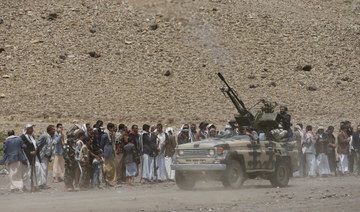AL-MUKALLA: The chairman of Yemen’s Presidential Leadership Council, Rashad Al-Alimi, on Wednesday urged the EU to intensify and expand its assistance to Yemen. He called for financial aid for developmental and economic projects, in addition to the existing help for efforts to alleviate Yemen's worsening humanitarian crisis.
During a meeting with European Council President Charles Michel at the EU headquarters in Brussels, Al-Alimi said the bloc should send funds to Yemen, through the nation’s central bank in Aden, to support the depreciating currency and ensure that humanitarian aid is not looted or exploited by the Iran-backed Houthi militia.
The Yemeni leader also urged the EU to take a more active role in efforts to secure peace in Yemen by increasing the pressure on the Houthis to cooperate with international efforts to end the war, and taking additional steps to punish the militia’s Iranian sponsors.
“The chairman of the Presidential Leadership Council commended European efforts to place the Iranian Revolutionary Guards on the terrorist list, citing the group’s disruptive activities in the area, which endanger world peace and security,” Yemen’s official SABA news agency reported.
During his meeting with Michel, Al-Alimi reiterated the commitment of his government to considering all peace offers, and expressed the hope that the ongoing regional and international mediation process would yield beneficial results for peace in Yemen.
The Yemeni leader arrived in the Belgian capital on Tuesday as part of a European tour that will also include a visit to Germany. In addition to seeking economic and political support for the country’s internationally-recognized government, he will discuss with EU officials the refusal by Houthis to renew a UN-brokered ceasefire, which came into force in April last year but expired in October without an agreement for an extension, and continuing arms shipments to the Houthis from Iran.
“This is part of the president’s attempts to gather international support for the (Presidential Leadership) Council and the government, their vision for achieving peace and stability, and the role necessary to tackle Houthi intransigence and Iranian weapons supplies to militias,” a Yemeni government official, who asked not to be named, told Arab News.
Al-Alimi’s visit to the EU began a day after Yemeni Prime Minister Maeen Abdulmalik Saeed urged foreign donors and financial institutions to provide help to the country immediately and not wait until the war is over.
Speaking at the World Government Summit in Dubai on Tuesday, Saeed said the world should not wait for peace in Yemen before assisting the nation. He added that his government had successfully restored state institutions, including the central bank, that can manage assistance.
“Saving Yemen is by maintaining aid,” he said. “Some say that we await peace; peace might be achieved after weeks, months or years.”
He identified Saudi Arabia and the UAE as key supporters of his nation throughout the war and said that aid from both countries had helped to stabilize the country and prevent it from collapsing completely.
“Our brothers were there for us through thick and thin,” Saeed said. “Yemen would have finished without the brothers’ help.”
Saudi Arabia had provided more than $420 million of fuel to help keep the country’s power plants and essential services running, he added, while the UAE is developing a solar power station in Aden and a huge dam in southern Yemen.
The prime minister said drone attacks by the Houthis on oil installations had halted oil shipments, costing the nation almost $1 billion and disrupting government reforms and economic plans.
“Yemen is going through a tough and sensitive period due to the war and the Houthi takeover, as well as their control of the political capital, Sanaa, and the state’s core institutions,” he added.
Saeed also talked about the effect the war has had on the Yemeni people and said that the country has experienced a “brain drain” as a result of a decline of more than 75 percent in the value of university professors’ salaries.
“The quality of education is something that both I and the government are concerned about,” he said. “We are facing a brain drain as university professors leave the country for other countries.
“University professors’ wages used to range between $1,300 and $1,400 before the war but they are now $300. We can keep academics in this situation.”






















